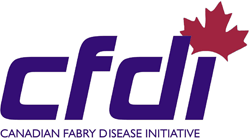About
The Canadian Fabry Disease Initiative:
| ClinicalTrials.gov Identifier: | NCT00455104 |

Another purpose of this study is to establish a national registry which will collect information on all persons with Fabry Disease in Canada.
Early ERT studies involving humans had small numbers of subjects and the studies were of short duration. The results of these clinical studies did lead to approval of the therapy in many countries around the world including Canada. To date though, evidence of the usefulness of ERT and its direct impact on the natural course of Fabry disease has been limited, while its cost continues to be very high. As a result of these issues, there will need to be continued and long-term collection of information related to the effectiveness of ERT to better document its true clinical outcomes in Canadian people with Fabry disease.
The 3 goals of this nation-wide study are as follows:
- To maintain an established national database for the identification and monitoring of all subjects with Fabry disease in Canada;
- To determine the clinical outcome of patients under various treatments of Fabry disease;
- To determine of urine and plasma Gb3 and globotriaosylsphingosine (lysoGb3) and their analogues can be biomarkers for Fabry disease and can predict clinical outcomes in this condition.
The Canadian Fabry Disease Initiative National Registry (CFDI-NR) is an observational, voluntary registry designed to collect outcomes data on Fabry disease from individuals living in Canada. This registry was initially established as part of the Canadian Fabry Disease Initiative (CFDI). This data will be used to study the natural progression of Fabry disease, to determine the outcomes associated with therapeutic products, both established and in development and to correlate biomarkers in blood and unine with these outcomes
Data will be collected at baseline and every 6 months as follows:
- Medical History
- Physical examination
- Neurological exam
- Blood tests including alpha galactosidase levels and Biomarker samples
- Electrocardiogram
- Echocardiogram or Cardiac MRI
- Holter monitor
- MRI or CT Scan
- Health Questionnaires
- Review of current medications
- Urine tests
To date though, evidence of the usefulness of ERT and its direct impact on the natural course of Fabry disease has been limited, while its cost continues to be very high (approximately $300,000 CDN per year per patient). As a result of these issues, there will need to be continued and long-term collection of information related to the effectiveness of ERT to better document its true clinical outcomes in Canadian people with Fabry disease.
Eligibility
Ages Eligible for Study: ≥ 5 Years
Genders Eligible for Study: Both
Accepts Healthy Volunteers: No
Criteria
INCLUSION CRITERIA:
- Clinical diagnosis of Fabry disease
- Age ≥ 5 years
- Able to give informed consent AND
- Willing to comply with recommended schedule of assessments AND
- Holding Canadian citizenship or being a landed immigrant
EXCLUSION CRITERIA:
- Inability to give informed consent
- Inability or unwillingness to comply with recommended assessments
- Estimated life expectancy < 1 year
- Non-disease causing mutation
- Under 5 years of age
